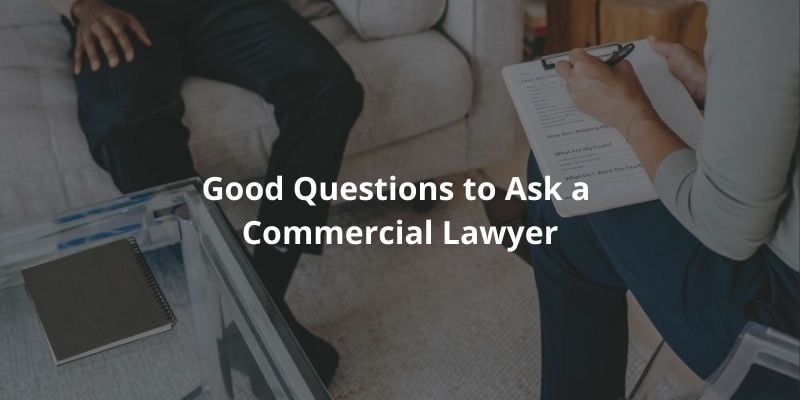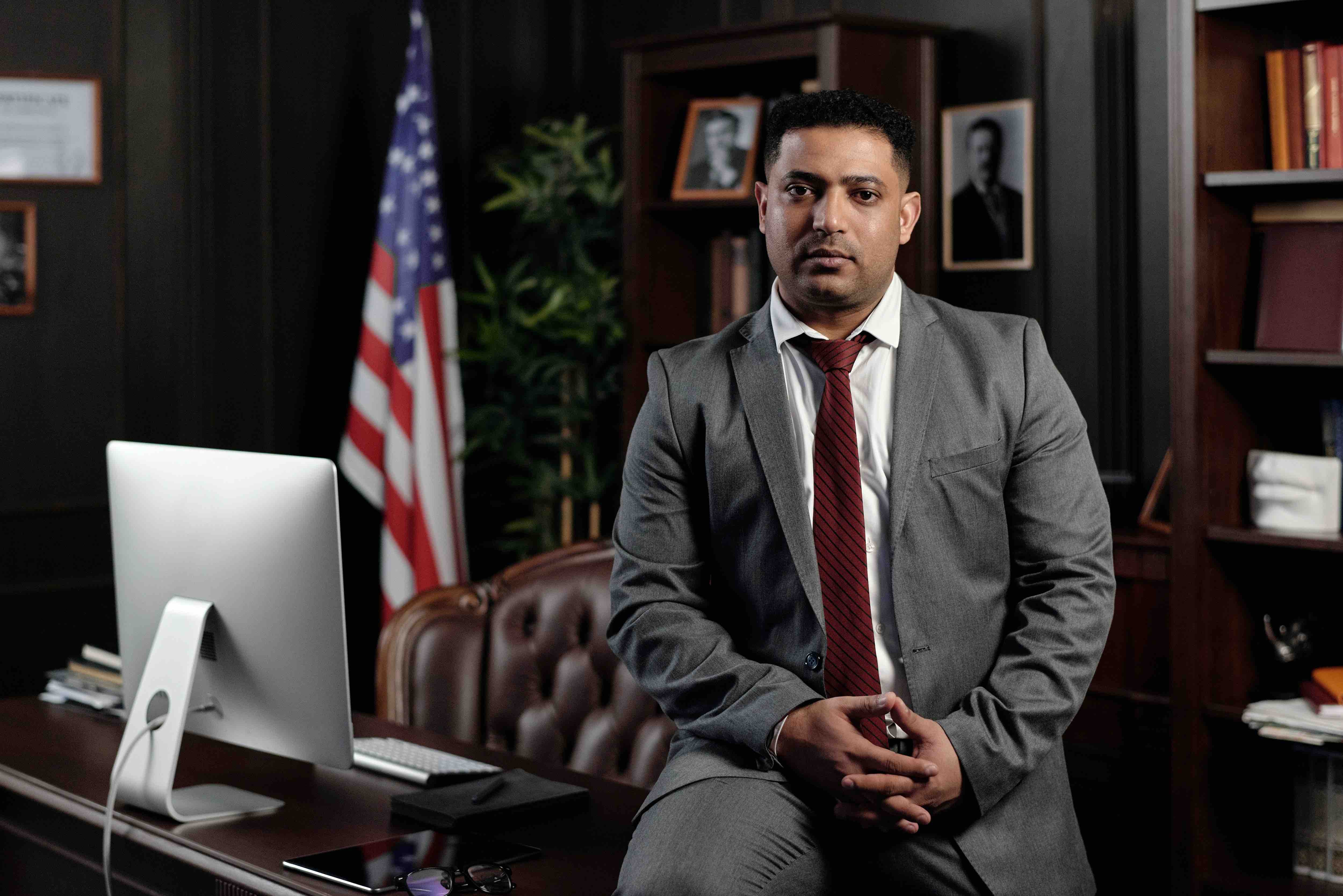Questions to Ask a Commercial Lawyer: A Guide for Business Owners
7 Dec 2023
1 Apr 2021
min read

If your business is facing a legal issue, you’ll want to hire a commercial lawyer to ensure that your business makes the most informed decisions possible. Commercial lawyers are lawyers who work on legal issues relating to business transactions and focus on contractual issues arising from the transactions. Dealing with a commercial lawyer is no small decision, however, as they charge by the hour and have sky-high rates. If you are looking to speak to a commercial lawyer, you will need to be as prepared and informed as possible to get your value for money.
Here is a list of questions you should ask your lawyer whilst having preliminary discussions about your legal issue with a commercial lawyer.

What types of questions you should ask a commercial lawyer
There are two broad questions you should be asking a commercial lawyer.
Firstly, you should be asking general questions about the lawyer. These general questions will help you understand the lawyer’s background, experience, how they operate, and the services you can expect from them. Asking these general questions will help you ascertain whether the lawyer is suitable for your specific issue.
Secondly, you should be asking specific, business-related questions regarding your legal issue. Asking these questions will help you ascertain how the lawyer will deal with your legal issue and whether they are suitable specifically in that area.
General questions you should ask a commercial lawyer
First, we will cover what you should ask regarding the first type of question – general questions you should ask to better understand the lawyer.
1. How long have you practised law?
Some lawyers may have practised the law for a long time and are highly experienced, while other lawyers may be newly qualified.
Generally, the more experienced a lawyer is, the greater their expertise in certain areas of law. It takes years of practice for lawyers, dealing with cases in a particular area of law, to develop deep expertise in that area. However, this does not necessarily mean that your legal issues will not be dealt with equally as well by a lawyer with less experience. The amount of time they have been practising the law should merely be one of the factors you consider.
Whether you should opt for a more experienced lawyer or a less experienced lawyer will depend on how complex your legal issue is and what your budget allows.

2. What type of cases do you generally handle?
This is an important question, as lawyers are specialists. Lawyers generally spend most of their careers practising one area of law. You should make sure to ask your lawyer what kind of cases they generally handle. This will give you an idea of how much of their work is dedicated to the area of law you are concerned with.
The more cases the lawyer has handled surrounding your issue, the more experience they will have and the better they will be able to navigate and handle your issue.
3. What type of clients do you typically work with?
This is another important question that people often forget to ask their lawyers.
You could ask whether your lawyer’s typical clients are individuals or companies – as if you are a company and the lawyer usually represents individuals, the lawyer may not be suitable for your needs. You should instead look for a lawyer specialising in representing businesses as different considerations must be accounted for by a lawyer when resolving legal issues when they are a company as opposed to an individual.
For the same reason, it might be important to determine the size of the business the lawyer typically represents. For instance, if a lawyer may only represent large corporations, the lawyer will likely be unsuitable if you are a small business.
4. What are your legal fees and how are they calculated?
You do not want to be met with surprise when you receive the final bill from your lawyer. It is therefore important to ask your lawyer how they will charge you for their services. These are the typical pricing structures used by commercial lawyers:
(a) Hourly Rate
This is when lawyers charge based on time – the number of hours – they spend dealing with your issue. Each hour they spend on the issue, they will charge a certain rate. This can range from $100 to $1000 per hour, depending on the lawyer. This is the most common means by which lawyers charge clients.
(b) Flat Fee
This is when lawyers charge a flat fee to help deal with a certain legal issue. This pricing structure is generally used by lawyers for legal matters that are predictable and ordinary – such as drawing up a will.
(c) Retainer Fee
Under this pricing structure, you give the lawyer a sum of money upfront – this is called a ‘retainer’ – from which the lawyer will deduct a certain amount based on their hourly rate, as the lawyer proceeds with handling your issue.
By asking the lawyer about the nature of legal fees, you will walk away knowing whether you can afford the lawyer’s services and how you will be required to pay should you decide to hire the lawyer.
As a follow-up to this question, you might want to ask for an estimate of the cost to deal with your issue. While these are only estimates and are likely subject to change, it serves as a ballpark range that you can keep in mind as you make decisions.

5. How much of my case will be handled by legal assistants or paralegals?
Oftentimes, lawyers are not the only people involved in helping you deal with your legal issue – paralegals and legal assistants are often involved. If others will be involved in working on your legal issue, you should ensure that this is reflected in the estimated billing fee.
6. Are there other ways to solve my legal issue?
You should ask your lawyer whether there are any other, less expensive means of resolving your legal issue. Sometimes, your issue can instead be dealt with by a company secretary or another professional. A good lawyer would inform you that this is the case.
7. How will you let me know what’s happening with my case?
Communication is critical while dealing with disputes to ensure all parties are informed.
You should therefore ask the lawyer how you will be communicated with - whether by email, text, or oth,erwise. You will want to ensure you are receiving timely updates about progress regarding your legal issue.
8. Can you provide me with references from other SMEs you have worked with?
You could ask the commercial lawyer to provide you with references from other small businesses that they have advised in the past.
Also, do your due diligence – try searching their name online and see if anyone has left any reviews regarding their services. If they have a track record of successfully helping businesses like you, then they might be a good fit for you.

Specific questions you should ask your commercial lawyer regarding your issue
Next, we will be focusing on the second kind of question – specific questions regarding your legal issue which you should ask your commercial lawyer.
1. What are my rights and obligations?
Every party to a contract will have rights and obligations.
Rights are a set of entitlements that a contracting party benefits from. For instance, a party to a sale of goods contract might have a right to purchase a particular product, the right to sell a product, or a right to be the only seller of a product.
Obligations on the other hand are a set of duties or responsibilities that a party agrees to perform as part of the contract. For instance, a party to a sale of goods contract might have the obligation to make payment for goods by a particular date.
When confronted with a commercial dispute, therefore, you should ask your lawyer what rights you are entitled to and what obligations you are subject to under your contract in the situation.
For instance, let’s say you find yourself in a situation where you are struggling to get a customer to pay you for goods you sold. You should ask your lawyer what rights you hold in these circumstances. Upon reviewing your contract, your lawyer would likely inform you that you have the right to charge interest on the outstanding amount.
2. What are my potential risks and liabilities?
When facing a legal issue, a key question to ask your lawyer is what risks and liabilities you might potentially be exposed to – this is particularly important if you are the wrongdoer.
Liabilities refer to the responsibility of a party for the losses or damages incurred by another party.
You should also ask your lawyer what the extent of the risks or liabilities are. Knowledge of this will help you determine the best course of action to resolve your dispute, like whether to pursue a settlement or sue the other party.
3. Do I have a right to bring a claim?
The fact that there has been a wrong committed by the other party in the context of a business transaction, does not always mean you have the right to bring a claim.
There may be a clause within your contract that precludes you from bringing a claim for that wrong. For instance, you might have agreed to an exclusion clause in your contract, which explicitly states that you cannot hold the other party liable for that wrong.
Other times, there may be legislation that would preclude you from bringing a claim.
4. How much do you think my claim might be worth?
This is an important question. Sometimes, despite having a legal claim for which you are likely to be compensated, the compensation you would be entitled to may be minimal.
The compensation you may be entitled to might be less than the legal fees you will have to dish out to your lawyer. If this is the case, you might have to reconsider your decision to take legal action. Asking your lawyer this question therefore can help you avoid this from happening.
5. Should I make a settlement?
Often, disputes end up being resolved through negotiation. Instead of using the other party, the parties negotiate and agree on a fee to be paid by the wrongdoer to the innocent party. In turn, the other party agrees to waive any claims associated with the dispute.
Settlement is often preferable to litigation as litigation is stressful, time-consuming, and costly.
The settlement requires the execution of a settlement agreement – a legally binding agreement that ensures the final settlement of the claims one party has against the other.
If you think settlement agreements might be more suitable for your business, you can learn more about them here.
Please note that this is a general summary of the position under common law and does not constitute legal advice. As the laws of each jurisdiction may be different, you may wish to consult your lawyer.
Keywords:

